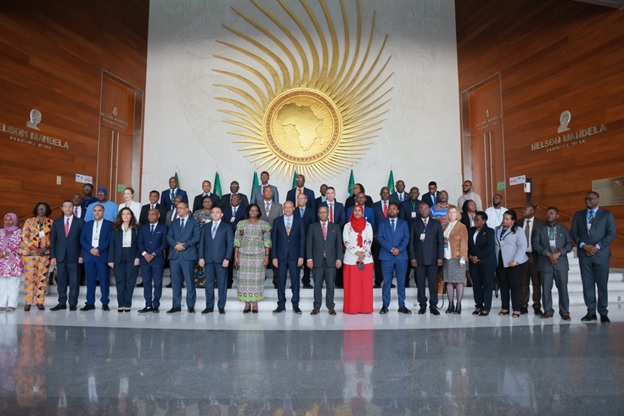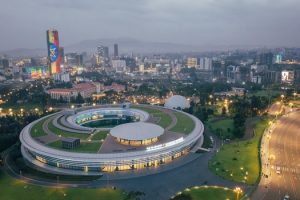
In an era defined by rapid technological advancement, demographic shifts, and climate challenges, African nations are reimagining the architecture of governance. Central to this transformation is the urgent need for innovative, integrated, and digitally empowered public service delivery models—systems that not only serve citizens faster and more equitably but also rebuild public trust through responsiveness and accessibility.
At the heart of this continental shift stands Ethiopia’s Mesob One-Stop Service Center, an emerging benchmark in digital governance innovation, now drawing attention across Africa.
The recently concluded 10th Africa Public Service Day (APSD) conference, held in Addis Ababa in June 2025, served as a vibrant platform for showcasing Africa’s bold commitment to digital transformation in governance. Co-hosted by the African Union (AU), the Government of Ethiopia, and the United Nations Department of Economic and Social Affairs (UN DESA), the forum brought together ministers, experts, development partners, and civil society actors to chart a new course toward agile, resilient, and citizen-centered governance systems.
The conversations and declarations from the summit reinforced a powerful continental consensus, aiming to realize digitalized, inclusive, and integrated public services in Africa in the near future.
At the center of the AU’s message during the forum was the call for people-centered digital governance systems capable of addressing deep-seated inequalities and bridging historical service delivery gaps. This digital shift primarily targets achieving inclusion and equity in public service delivery and overcoming traditional public service administration methods that remain sources of public dissatisfaction.
Speaking at the opening ceremony of the event, Patience Zanelie Chiradza, Director for Governance and Conflict Prevention at the AU Commission, emphasized that agile institutions must now be equipped to deliver seamless services—physically, digitally, and emotionally—amid growing climate, economic, and geopolitical volatility.
“Public service delivery lies at the heart of the social contract,” she said, highlighting the need for data-driven, ethical use of artificial intelligence, stronger data governance, and real-time citizen engagement to deliver efficient and effective service. She urged AU member states to accelerate digital transformation through infrastructure investment, inclusive access, and governance frameworks that prioritize accountability, transparency, efficiency, and local ownership.
One of the most compelling success stories presented at APSD 2025 was Ethiopia’s Mesob One-Stop Service Center, the Modern Ethiopian Service for Organized Benefits. Launched in April 2025 by Prime Minister Abiy Ahmed’s administration, Mesob is a hybrid and seamless digital-physical platform that consolidates service delivery from 23 institutions under one roof, offering 124 integrated services. Ethiopia’s Mesob Platform serves as a blueprint for modernizing Africa’s public service sector by revolutionizing the sector.
Ethiopian Civil Service Commission Deputy Commissioner, Almaz Mesele, reported during the conference that a remarkable 92 percent citizen satisfaction rate was registered during the initial months of Mesob. Citing significant improvements in accessibility, efficiency, and fairness, the Mesob Center brings transformative changes to the sector.
For his part, Deputy Prime Minister of Ethiopia, Temesgen Tiruneh, stated at the opening session of the 10th APSD that “Mesob is more than a platform—it’s a promise that no one will be left behind.” He announced plans to expand the model to all 12 regional states and two city administrations by September. He underscored that Mesob aligns with the federal government’s seven-pillar civil service reform blueprint, prioritizing citizen-centric redesign, inclusive service access, competency-based systems, and digital governance.
Introducing digital technology in the public sector is critical to transforming service delivery. Ethiopia’s civil service reform strategy—framed around the principles of equity, inclusivity, and institutional agility—illustrates how digital technology can modernize the public sector and meet the demands of a changing society. According to Civil Service Commissioner Mekuria Haile (PhD), the reform’s design reflects both national priorities and global commitments, such as the 2030 Sustainable Development Agenda and the African Union’s Agenda 2063.
“Good governance is not just a constitutional principle—it is a practical promise to leave no one behind,” Mekuria said, adding that Ethiopia’s reforms aim to foster performance-based accountability, innovation, and professionalism throughout the public sector. Initiatives like Mesob are integral to this shift, reducing institutional fragmentation while increasing transparency and citizen satisfaction. Adaptive and effective public institutions are essential to respond to Africa’s multi-dimensional challenges. “The decisions we take, the partnerships we strengthen, and the reforms we accelerate will shape millions of lives,” he stressed.
The Addis Ababa Declaration, adopted at the closing ceremony of the APSD-2025 summit reinforced a shared continental roadmap toward governance transformation. The declaration committed African states to adopt decentralized governance frameworks, participatory budgeting practices, and legal reforms that emphasize meritocracy and digital integration.
Specifically, the declaration calls for the expansion of inclusive infrastructure, multilingual digital platforms, the application of cybersecurity protocols, ensuring proactive feedback systems and strengthening cross-border digital collaboration mechanisms to promote digital transformation in the public sector in Africa.
Lessons from Mesob: Replicability and scalability
What sets Mesob apart is not merely its technical sophistication but its philosophical grounding. The platform integrates technology with human-centered service design, ensuring dignity and fairness in citizen interactions. It’s seamless and hybrid nature—combining both physical centers and digital portals—allows it to cater to Ethiopia’s diverse geography and infrastructure realities.
Moreover, Mesob’s success has implications beyond Ethiopia. As Deputy Commissioner Almaz noted, the platform is a cornerstone of Ethiopia’s Second Homegrown Economic Reform agenda, making it both a governance tool and a development strategy. For African countries grappling with outdated bureaucracies, fragmented service delivery, and low public trust, Mesob offers a scalable and replicable model for building future-ready institutions.
Toward a Digitally Empowered Africa in the Public Service Sector
As Africa looks ahead, the challenge is not merely to adopt technology but to integrate it in a way that advances justice, inclusion, and accountability. Digital governance must be paired with ethical leadership, sustainable financing, and meaningful citizen engagement. Initiatives like Mesob remind us that transformation is not only possible—it is already underway.
With increasing interest in South-South cooperation, the African Union and its member states are well-positioned to support peer learning and cross-border collaborations. The proposed AU-led digital innovation portal, as mentioned in the Addis Ababa Declaration, will play a vital role in this process—offering a space to share models, data, and best practices.
Digital public service delivery is no longer a luxury for Africans; it is a governance imperative. Africa’s future institutions must be capable of responding swiftly to citizen needs, particularly in contexts of crisis, inequality, and systemic exclusion. Platforms like Mesob demonstrate how digital innovation, when grounded in human needs and inclusive principles, can transform governance from an obstacle into an enabler of opportunity.
As nations align their strategies with Agenda 2063 and the Sustainable Development Goals, the Mesob model stands as a continental benchmark—proof that African solutions can lead the way in global public sector innovation. The momentum generated by APSD 2025 must now be harnessed into action, ensuring that the dream of equitable, seamless, and digital governance becomes a lived reality for all Africans.
BY DARGIE KAHSAY
THE ETHIOPIAN HERALD FRIDAY 4 JULY 2025





